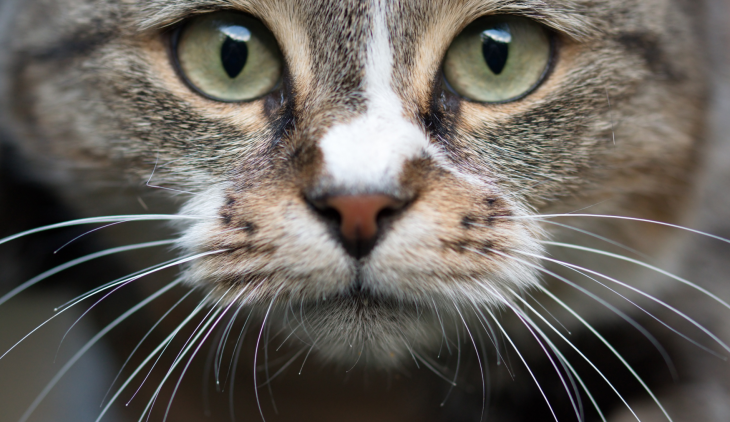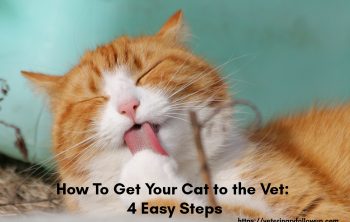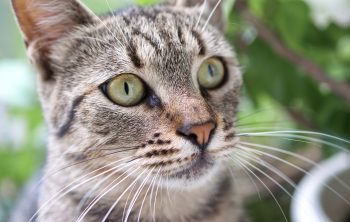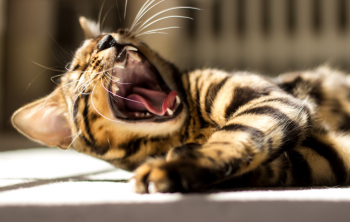As your cat ages, her needs change. Both physically and emotionally. Aging is not a disease, but there are many diseases, ailments, and illnesses that become more common as cats age. Here are some things you can do to help your cat live their best life at any age – especially senior cats.
Physical Changes
As cats age, they often slow down. They may not jump as often or as high anymore. They may not feel comfortable jumping or climbing on and off the bed or couch. Many pet parents attribute this to age and ignore it, but your cat is telling you something. These changes in activity can be due to discomfort from arthritis and other kinds of mobility issues. Osteoarthritis (arthritis) is due to wear on joints. It results when the smooth cartilage on the surface bones gets worn away. Arthritis can be painful, and it is not reversible. Keeping cats at a healthy weight and making sure they get adequate daily exercise will help slow or prevent this normal aging process. If your cat already has signs of arthritis, talk to your veterinarian about pain medication and other management tools.
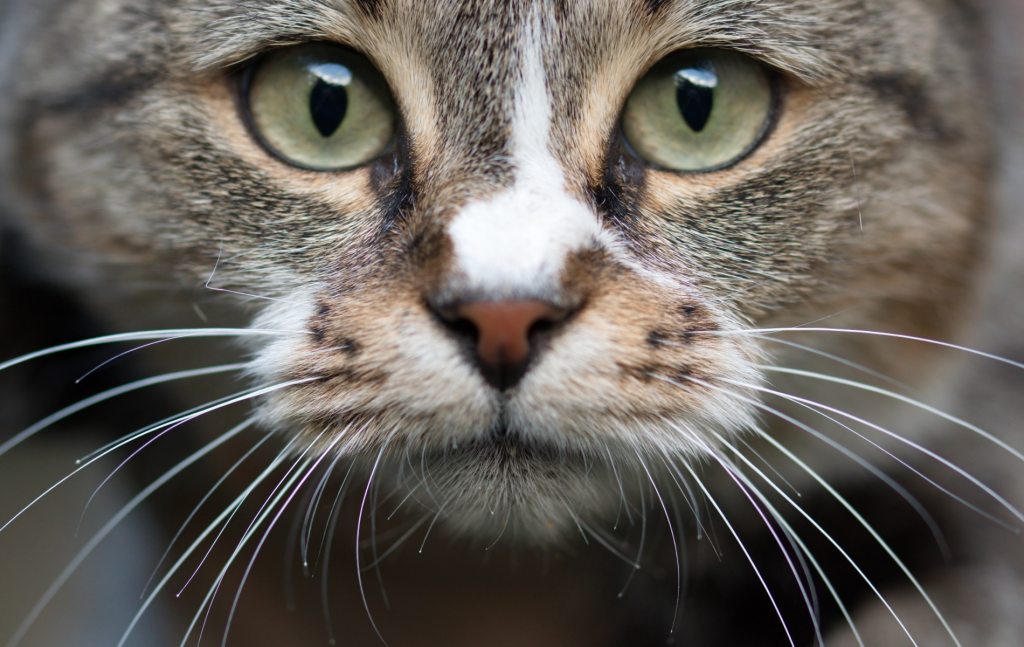
Senior Cat Grooming Habits
You may notice that your senior cat doesn’t groom as often or isn’t as thorough. For example, you may see greasiness or dandruff on your senior cat’s back. Greasiness and dandruff are especially common in overweight cats. The combination of size and arthritis means these cats are unable to reach all the parts of their bodies. In addition to addressing the sources of the problems of weight and pain, grooming your cat gently but completely can help keep her looking and feeling beautiful. Similarly, senior cats may not use the scratching post as vigorously and may need their nails trimmed if you aren’t comfortable trimming nails or don’t know how your veterinarian can help.
Litter Box Issues
Sometimes, cats who used to have perfect litter box habits suddenly defecate outside the box. Litter box issues can also be a sign of physical discomfort because your cat may find it difficult or uncomfortable to get in and out of the litter box or to posture to defecate. Simple changes, such as putting the litter box in more accessible locations or reducing the height of one side of the box, can make the whole process easier for your cat. Senior and geriatric litter boxes are available, but you can also do-it-yourself. Be sure to put a sand-catching mat around the litter box so that your cat doesn’t toss litter onto the floor.
Dietary Needs of Your Senior Cat
Along those same lines, changes in litter box behaviors can be due to differences in metabolism. Senior cats may need to be encouraged to drink an adequate amount of water to avoid constipation. Adding water fountains or extra bowls around the house can help, especially if your cat has difficulty getting around. Switching to a canned or wet diet will also help your cat get more fluid since those types of food contain more moisture. Hydration becomes especially crucial if your cat develops kidney disease whereby the kidneys can no longer do their job of retaining water, and instead, your cat loses water as urine.
Nutritionists recommend senior-specific food for cats over eight years old. This is because your cat’s nutritional needs change as she ages. She will benefit from a diet lower in salt and higher in antioxidants such as omega-3 fatty acids. Many older cats require a prescription diet as part of the management plan for kidney disease, urinary issues, or diabetes. Feeding the appropriate diet as recommended by your veterinarian, is an essential component of treatment.
Veterinary Care for Senior Cats
Diet is just one aspect of the recommendations your veterinarian will discuss to keep your aging cat healthy. Senior cats should visit the veterinarian every six months. While that may seem frequent, it’s equivalent to an exam every two years for a person, and a lot can change in that time. In addition to the exam, your veterinarian will discuss any changes you’ve noticed and anything that you can do at home to keep your cat comfortable and healthy.
If you notice any changes, including weight loss or gain, change in appetite, change in litter box behavior, or change in personality, see your veterinarian. These may be symptoms of the illnesses that become more common as your cat ages, including kidney dysfunction, overactive thyroid, diabetes, and others. All of these illnesses are diagnosed through a physical exam, bloodwork, and urine testing. While people used to think that if they couldn’t give their cat a pill that they couldn’t treat disease, there are now many options for getting medication into your pet. Always bring up your concerns with your veterinarian, together you can come up with a plan that will extend your cat’s golden years.
Behavior Changes
By the time your cat reaches her senior years, you know all her quirks. You know how she likes her ears scratched and that she will wake you at night if she can see the bottom of her food bowl. That’s why it can be so unsettling when you notice changes in your cat’s behavior.
Many changes in behavior, even including how much your cat suns herself, can have a medical cause. It is essential to see your veterinarian to make sure there is nothing physical underlying the changes you’ve noticed. For example, vision loss can lead a cat to cry out at night if she feels lost. Knowing this and turning on night lights can make your cat feel much more comfortable.
Environmental Changes
Senior cats are often set in their ways and don’t respond well to change. These changes could be moving into a new home, having houseguests, or even changes in house decor or furniture. For your cat’s sake, make all changes slowly. If possible, let your cat have a safe space, a room that isn’t changed, to help her adjust. Talk to your veterinarian if you are making significant changes so that you can prepare your cat or provide what she needs to adapt quickly.
Happy, Healthy, Long Life
A cat can live for 20 years or longer. Help keep them happy, healthy, and comfortable by paying attention to changes. We can’t slow down the clock, but we can slow down the effects of aging by giving our cats what they need for whatever stage of life they are in at that moment.

